Kevin DeYoung's Blog, page 185
March 2, 2011
February Book Briefs
February 2011
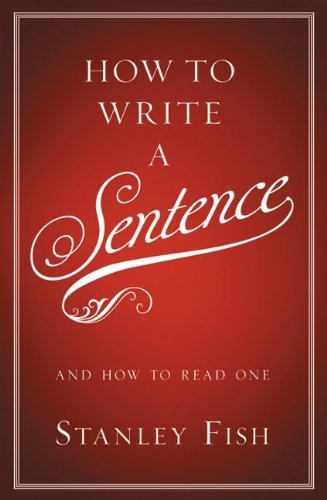 Stanley Fish. How to Write A Sentence (Harper 2011). A well written book on well written sentences. Though his postmodern colors show through here and there, overall Fish exults in the power of statements. He quotes liberally from the classics, including Christian classics. Writers should read this book.
Stanley Fish. How to Write A Sentence (Harper 2011). A well written book on well written sentences. Though his postmodern colors show through here and there, overall Fish exults in the power of statements. He quotes liberally from the classics, including Christian classics. Writers should read this book.
 John M. Frame. Salvation Belongs to the Lord (P & R 2006). An excellent mini-systematic theology. Frame is solid without being stuffy. He comes down firmly on the right issues and treads lightly on the others. Though personally I was not helped by Frame's penchant for putting everything into groups of threes and then relating various triplets to each other, this is still a wonderful introduction to evangelical, Reformed theology.
John M. Frame. Salvation Belongs to the Lord (P & R 2006). An excellent mini-systematic theology. Frame is solid without being stuffy. He comes down firmly on the right issues and treads lightly on the others. Though personally I was not helped by Frame's penchant for putting everything into groups of threes and then relating various triplets to each other, this is still a wonderful introduction to evangelical, Reformed theology.
 Robert L. Plummer. Paul's Understanding of the Church's Mission (Wipf & Stock 2006). A brilliant defense of the surprisingly controversial proposition that Paul expected his churches to evangelize. Plummer's attention to Scripture is commendable and makes for a convincing argument. I only wish the book weren't so dissertationy.
Robert L. Plummer. Paul's Understanding of the Church's Mission (Wipf & Stock 2006). A brilliant defense of the surprisingly controversial proposition that Paul expected his churches to evangelize. Plummer's attention to Scripture is commendable and makes for a convincing argument. I only wish the book weren't so dissertationy.
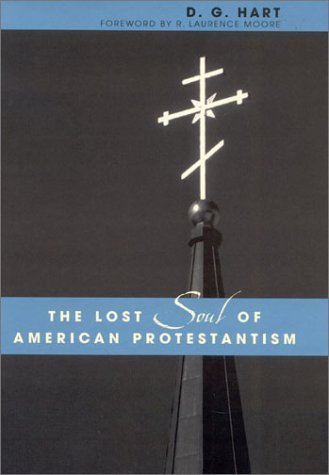 D. G. Hart. The Lost Soul of American Protestantism (Rowman & Littlefield 2002). My copy is marked up with copious notes and underlines. Lots to think about. I like the passion for confessionalism. I worry for the way it is always pit against revival, pietism, and evangelicalism.
D. G. Hart. The Lost Soul of American Protestantism (Rowman & Littlefield 2002). My copy is marked up with copious notes and underlines. Lots to think about. I like the passion for confessionalism. I worry for the way it is always pit against revival, pietism, and evangelicalism.
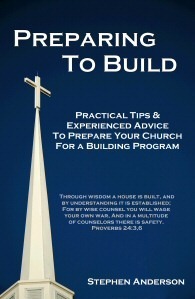 Stephen Anderson. Preparing to Build (AMI 2006). A great book for any church considering new construction. Someone in the church should read this book before undertaking a building program. It is exceedingly practical; full of good sense.
Stephen Anderson. Preparing to Build (AMI 2006). A great book for any church considering new construction. Someone in the church should read this book before undertaking a building program. It is exceedingly practical; full of good sense.
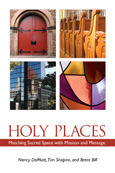 Nancy DeMott, Tim Shapiro, and Brent Bill. Holy Places: Matching Sacred Space with Mission and Message (The Alban Institute 2007). Less practical, less helpful than the previous book, with lots of fruity mainline jargon to boot. The design is sharp, but the content is a solid "meh." Read the other one.
Nancy DeMott, Tim Shapiro, and Brent Bill. Holy Places: Matching Sacred Space with Mission and Message (The Alban Institute 2007). Less practical, less helpful than the previous book, with lots of fruity mainline jargon to boot. The design is sharp, but the content is a solid "meh." Read the other one.
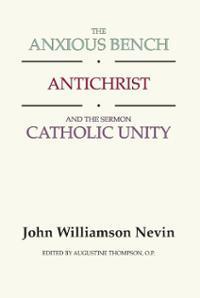 John Williamson Nevin. The Anxious Bench (Wipf & Stock 2000). A withering critique, circa 1844, of Finneyism and the New Measures. Nevin advocates the system of the "Catechism" over against the "Bench." He didn't sell me on every point, but in general I thought the criticism warranted and would be happy to see more "Catechism," which Nevin is careful to say should not be confused with formalism or lifeless orthodoxy.
John Williamson Nevin. The Anxious Bench (Wipf & Stock 2000). A withering critique, circa 1844, of Finneyism and the New Measures. Nevin advocates the system of the "Catechism" over against the "Bench." He didn't sell me on every point, but in general I thought the criticism warranted and would be happy to see more "Catechism," which Nevin is careful to say should not be confused with formalism or lifeless orthodoxy.
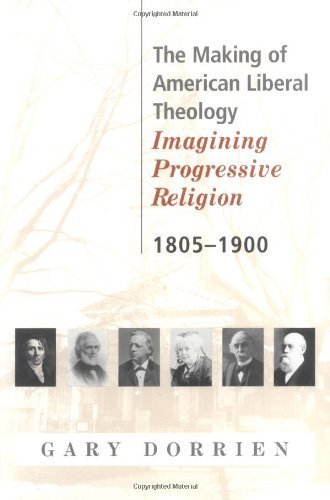 Gary Dorrien. The Making of American Liberal Theology: Imagining Progressive Religion, 1805-1900 (vol. 1) (Westminster John Knox Press 2001). I don't know much about Dorrien except that when he began the series he was at Kalamazoo College and now he is at Union Theological Seminary. From what I've read (and I did not read every page of this book), he is sympathetic to liberalism (hence the position at Union), but also fair and clear. I doubt that many evangelicals need to read these volumes, but some pastors and students may want to have them as reference material on their shelves.
Gary Dorrien. The Making of American Liberal Theology: Imagining Progressive Religion, 1805-1900 (vol. 1) (Westminster John Knox Press 2001). I don't know much about Dorrien except that when he began the series he was at Kalamazoo College and now he is at Union Theological Seminary. From what I've read (and I did not read every page of this book), he is sympathetic to liberalism (hence the position at Union), but also fair and clear. I doubt that many evangelicals need to read these volumes, but some pastors and students may want to have them as reference material on their shelves.
February 28, 2011
Two Thoughts on the Rob Bell Brouhaha
Well, my ruminations got the best of me. I think there is something more to say about the Rob Bell brouhaha. Yes, even before the book comes out.
Actually two somethings. Consider this an effort to clear the underbrush so we might see the forest and trees.
Good Verse, Wrong Time
One, it needs to be stated again that this is not a Matthew 18 issue. No one is obligated to respond in private to a promotional video that has been put out in public. Jesus said, "If your brother sins against you, go and tell him his fault, between you and him alone" (Matt. 18:15). Rob Bell has not sinned against Justin Taylor or John Piper. This is not a personal offense or an interpersonal squabble that should have been left in private. The general rule of thumb, supported by Matthew 18 and sanctified common sense, is we should not make a matter more public than it has to be. But by definition, YouTube videos and Vimeo clips and books and blogs are meant to be public. That's the whole point. The Love Wins trailer was not a private email correspondence intercepted by the Reformed Gestapo. It was deliberately made public and can be commented on in public.
Look at how the apostles handled false teaching in the New Testament. There's nothing to suggest Paul sat down to talk with Demas (2 Tim. 4:20), Jannes and Jambres (2 Tim. 3:8), Hymenaeus and Philetus (2 Tim. 3:17), or Hymenaeus and Alexander (1 Tim. 1:20). And even when Paul opposed Peter "to his face" he made a point to do it "before them all" (Gal. 2:11, 14). No one is required to talk to me before they criticize my books, and no one was required to call up Rob Bell before commenting on his Love Wins video.
Not Might, But Did
Two, the bigger complaint is that Justin Taylor or I or any number of bloggers and tweeters have completely jumped the gun in criticizing Bell for a yet to be released book. This would be a fair critique had we attempted to write a book review for a book we hadn't read. But our deep dismay and the reason for issuing an urgent warning is not based on what he might say in the book. It's based on what he did say in the video.
Here's what Bell says after the story about Ghandi and the piece of art:
Will only a few select people make it to heaven? And will billions and billions of people burn forever in hell? And if that's the case, how do you become one of the few? Is it what you believe or what you say or what you do or who you know or something that happens in your heart? Or do you need to be initiated or take a class or converted or being born again? How does one become one of these few?
Then there is the question behind the questions. The real question [is], "What is God like?", because millions and millions of people were taught that the primary message, the center of the gospel of Jesus, is that God is going to send you to hell unless you believe in Jesus. And so what gets subtly sort of caught and taught is that Jesus rescues you from God. But would kind of God is that, that we would need to be rescued from this God? How could that God ever be good? How could that God ever be trusted? And how could that ever be good news?
This is why lots of people want nothing to do with the Christian faith. They see it as an endless list of absurdities and inconsistencies and they say, why would I ever want to be a part of that? See what we believe about heaven and hell is incredibly important because it exposes what we believe about who God is and what God is like. What you discover in the Bible is so surprising, unexpected, beautiful, that whatever we have been told and been taught, the good news is actually better than that, better than we could ever imagine.
The good news is that love wins.
This is not back cover copy from the publisher. This is not a promo blurb written by an intern at HarperCollins. This not what Brian McLaren gave for an endorsement. This is what Rob Bell said.
And he is saying something. Don't think for a second the questions don't communicate something. These are not "let's explore together and see what the Bible says about these hard issues" kind of questions. Everyone agrees Bell is a remarkable communicator. He is not unaware of the effect of these three minutes. Words mean something and words do something. Whether the sentences end in question marks or not, these force of these sentences is to undermine—nay, to ridicule—the reality of eternal conscious punishment, the wrath of the God, and penal substitutionary atonement.
Imagine I do a video like this:
Will God save everyone? Does everyone go to heaven no matter how bad they were and no matter what they believed? Is Hitler there next to Bonhoeffer enjoying the same eternal bliss? What kind of God would that be? How would we make sense of Jesus' strong language about hell or the chilling scenes in Revelation? Would that God still be holy and just?
And what would that do to our understanding of the gospel? Would Jesus' death still be necessary? Would faith in him really be that important? Why would we still send out missionaries and evangelists? What would be so good about the good news if, in the end, there is no bad news? And if there is no hell, or we can't really be sure anyone is there, why have almost all Christians in all of history believed there was such a place of eternal suffering? Have we found something that historic orthodoxy has missed all these centuries?
What if the things you've heard recently are not the truth about Christianity? What if the warnings in Scripture are real warnings? What if God is purer than we thought, were worse than we imagined, and hell is as real as the nose on your face? What the "only way" means the only way? What if God is glorified in salvation and judgment? What if the God of love and Father of mercies is also a righteous Judge, a holy Sovereign, and a conquering King?
Nothing but questions. Not a single indicative proposition. Yet who could think for a moment that I am not teaching something? This is not mere provocation. It is not an expression of searching inquiry or humble wrestling. My questions pack a rhetorical punch. They tell you what I think is foolish and what is wise. They suggest that some beliefs are noble and others are not. They tell you what God is like and what you should believe about him. My questions teach. And only a teacher with stunning naivete or remarkable cowardice would suggest they didn't.
Please note, that last sentence is not about Bell. He has not stepped back from the questions saying they were only questions (maybe he does in the book, I don't know). But some folks claim that the video cannot be critiqued because he's only asking questions. Maybe he's just trying to sell books? Maybe he's just messing with us and in the book he will sound much more orthodox?
As to the former question, it doesn't matter if it's meant to be promotional, devotional, or confrontational, the fact is he's teaching. And false teaching of this depth and breadth needs to be addressed. This is not a conflict of personalities or an intramural turf war. This is about the gospel–what it means, what it accomplished, and what's at stake if we do not believe its good news.
I know many young evangelicals barely have any stomach for controversy, let alone strong words about a serious topic. But if there is no way to be simultaneously bold and humble; if there is no way to be a gentle, caring person while still speaking in clear tones about hurtful error; if there is no way to correct those who oppose sound doctrine without being a moral monster; if there's no way to love truth and grace at the same time, then there's no way to be a biblical Christian. Judgmentalism is a sin and Calvinists can be jerks. But not every judgment is sinful and not every truth is cruel just because Reformed people teach it.
And as to the latter question, if Bell ends up espousing a traditional view of hell, the wrath of God, and penal substitution, that would mean McLaren's blurb was misleading, the publisher's description was misleading, and Bell's video was misleading. Love Wins can be the second coming of Jonathan Edwards and it still doesn't change that what was communicated in the video was untrue to the Scriptures, inconsistent with historic orthodoxy, belittling of the cross, deceiving to unbelievers, and a tragic distortion of God's character.
Chasing After the Wind, But Maybe Not
I realize this post will not make universalists, inclusivists, and non-Christians change their minds. But perhaps there are some Rob Bell fans who have enjoyed the Noomas and learned from the books and you aren't quite sure what the fuss is all about. Why is everyone ragging on your favorite preacher? My exhortation is to watch the video again. Read through the words and see if they line up with the hymns you sing. See if the questions sound right next to Isaiah 53, John 3, and Romans 20-22. Look into Ghandi's Hinduism and see if that seems compatible with Christianity. Explore the giants of church history (e.g., Augustine, Luther, Calvin) and see what mainstream Christians have believed through the centuries. Read through some of the confessions or catechisms you may have grown up. Above all, search the Scriptures and see what God says. You may just conclude your old Sunday school teachers knew a thing or two.
Rob Bell is right about one thing: what you believe about heaven and hell says a lot about what you believe about God. That's why theological error of this magnitude cannot go unchecked. The God of the Vimeo clip is not a God of wrath, not a God of eternal recompense, not a God who showed us love in sending his Son to be a propitiation for our wretched sins, not a God whose will it was to crush the Suffering Servant in an exercise of divine justice and free grace. Indeed, says Bell—even if he says it with a question—such a God could not be good.
We don't have to guess if Bell will say something dreadfully, horribly, disgracefully wrong.
He already has.
Monday Morning Humor
Ok, so you may have noticed there were a few things going on over the weekend related to Rob Bell's new book. I ruminated about a further response to some of the comments, but at this point I don't think there's too much more to say until the book comes out. More to come in a few weeks.
Speaking of awkward transitions, it is still Monday morning and everyone is still in need of a little help to start the week. The video quality is homemade, but the audio does the trick. Brian Regan and politics is good (non-partisan) fun.
February 26, 2011
To Hell With Hell
At least now we know what Rob Bell thinks about hell.
LOVE WINS. from Rob Bell on Vimeo.
I am eager to read the book, not to pick a fight (though sometimes we need to fight), but because a book like this from a prominent pastor like this needs a response, many responses. We should be thankful for the clarity, but saddened by the content.
In the meantime, we must remember why God's wrath is necessary to make sense of the Bible, the cross, and our growth in godliness.
We need the doctrine of eternal punishment. Time and time again in the New Testament we find that understanding divine justice is essential to our sanctification. Believing in God's judgment actually helps us look more like Jesus. In short, we need the doctrine of the wrath of God.
First, we need God's wrath to keep us honest about evangelism. Paul reasoned with Felix about righteousness, self-control, and the coming judgment (Acts 24:25). We need to do the same. Without the doctrine of hell, we are prone to get involved in all sorts of important God-honoring things, but neglect the one thing that matters for all eternity, urging sinners to be reconciled to God.
Second, we need God's wrath in order to forgive our enemies. The reason we can forgo repaying evil for evil is because we trust the Lord's promise to repay the wicked. Paul's logic is sound. "Do not take revenge, my friends, but leave room for God's wrath, for it is written: 'It is mine to avenge; I will repay,' says the Lord" (Rom. 12:19). The only way to look past our deepest hurts and betrayals is to rest assured that every sin against us has been paid for on the cross and or will be punished in hell. We don't have to seek vigilante justice, because God will be our just judge.
Third, we need God's wrath in order to risk our lives for Jesus' sake. The radical devotion necessary to suffer for the word of God and the testimony of Jesus comes, in part, from the assurance we have that God will vindicate us in the end. That's why the martyrs under the throne cry out "How long, Sovereign Lord, holy and true, until you judge the inhabitants of the earth and avenge our blood?" (Rev. 6:10) They paid the ultimate price for their faith, but their blood stained cries will be answered one day. Their innocence will be established when God finally judges their persecutors.
Fourth, we need God's wrath in order to live holy lives. Paul warns us that God cannot be mocked. We will reap what we sow. We are spurred on to live a life of purity and good deeds by the promised reward for obedience and the promised curse for disobedience. If we live to please the flesh, we will reap destruction from God. But if we live to please the Spirit, we will reap eternal life (Gal. 6:6-7). Sometimes ministers balk at the thought of motivating people with the threat of eternal punishment. But wasn't this Jesus' approach when he said "Do not be afraid of those who kill the body but cannot kill the soul. Rather, be afraid of the One who can destroy both soul and body in hell" (Matt. 10:28)? Sometimes we need to literally scare the hell out of people.
Fifth, we need God's wrath in order to understand what mercy means. Divine mercy without divine wrath is meaningless. Only when we know that we were objects of wrath (Eph. 2:3), stood condemned already (John 3:18), and would have faced hell as God's enemies were it not for undeserved mercy (Rom. 5:10), can we sing from the heart "Amazing grace, how sweet the sound that saved a wretch like me!"
Sixth, we need God's wrath in order to grasp how wonderful heaven will be. Jonathan Edwards is famous (or infamous) for his sermon "Sinners in the Hands of an Angry God." It's still read in American Literature classes, usually as a caricature of the puritanical spirit of colonial New England. But few people realize that Edwards also preached sermons like "Heaven is a World of Love." Unlike most of us, Edwards saw in vivid colors the terror of hell and the beauty of heaven. We can't get a striking picture of one without the other. That's why the depiction of the heavenly New Jerusalem also contains a warning to the cowardly, unbelieving, vile, immoral, idolaters, and liars whose place is in "the fiery lake of burning sulfur" (Rev. 21:8). It's unlikely we will long for our final salvation if we don't know what we are saved from.
Seventh, we need the wrath of God in order to be motivated to care for our impoverished brothers and sisters. We all know the saying that Christians are so heavenly minded they are of no earthly good. The idea is that if all we think about are heaven and hell we'll ignore ministries of compassion and social justice. But what better impetus for social justice than Jesus' sober warning that if we fail to care for the least of our brothers we will go away to eternal punishment (Matt. 25:31-46)? The wrath of God is a motivator for us to show compassion to others, because without love, John says, we have no eternal life, and if we don't share our material possessions with those in need we have no love (1 John 2:17).
Eighth, we need God's wrath in order to be ready for the Lord's return. We must keep the lamps full, the wicks trimmed, the houses clean, the vineyard tended, the workers busy, and the talents invested lest we find ourselves unprepared for the day of reckoning. Only when we fully believe in the coming wrath of God and tremble at the thought of eternal punishment will we stay awake, keep alert, and be prepared for Jesus to come again and judge the living and the dead.
Excerpted from Why We're Not Emergent.
February 25, 2011
Churches that Hate Revivals
John Williamson Nevin (1803-86) was a severe critic of the New Measures of revivalism. His 1844 work, The Anxious Bench, deconstructs the whole philosophy and system of the non-churchly, anti-theological, decisionistic approach of the New Measures. He deplored the many so-called revivals of his day and all that they stood for.
But he did not hate true revival that grew out of the faithful ordinary ministry of the local church.
Churches that hate revivals, may be said emphatically to "love death." Every faithful pastor will be concerned to see his ministrations crowned with such special effusions of God's Spirit; and will stand prepared at the same time to hail with joy the first indications of their approach, and to put forth special efforts for the purpose of turning them to the largest account. (73)
Revivals are far from perfect. They can introduce confusion. The phony sort can be manufactured. Many harmful practices have been passed down and unbiblical patterns have been set in the name of revival. But let us still yearn for a true outpouring of God's Spirit. Let us pray for true religious fervor, for increased prayer, for conversions to Christ, for a greater hunger for God's word. God, keep our churches from loving death.
February 24, 2011
Distinguishing Marks of a Quarrelsome Person

Our evening service was canceled last week because of the snow. The portion below is an edited portion of the larger sermon, a message on conflict from Proverbs. I thought it was worth posting (although now I haven't preached it yet) as a follow-up to Tuesday's post.
*****
Quarrels don't just happen. People make them happen.
Of course, there are honest disagreements and agree-to-disagree propositions, but that's not what the Bible means by quarreling. While studying Proverbs recently I was struck by the fact that most of the advice about conflict is not on how to resolve it, but how to avoid it.
Quarrels, at least in Proverbs, are unnecessary arguments, the kind that honorable men stay away from (17:14; 20:3). These fights aren't the product of a loving rebuke or a principled conviction. These quarrels arise because people are quarrelsome. Some Christians have a lifeline to Speedway and love to pour gasoline on every tiny spark of conflict.
You don't have to be a card-carrying member of the nice Nazis to believe that quarreling is wrong. You only have to believe the Bible (James 4:1). Hot-headed, divisive Christians are not pleasing to God (Proverbs 6:19). We are told to drive them out (22:10) and avoid such people (Rom. 16:17). This doesn't mean we only huddle with the people we like. We are not talking about awkward folks or those who disagree with us. We are talking about quarrelsome Christians–habitually disagreeable, divisive, hot-headed church people.
So what does a quarrelsome person look like? What are his (or her) distinguishing marks?
1. You defend every conviction with the same degree of intensity. You don't talk about secondary issues, because there are no secondary issues.
2. You are quick to speak and slow to listen. You rarely ask questions and when you do it is to accuse or to continue prosecuting your case. You are not looking to learn, you are looking to defend, dominate, and destroy.
3. Your only model for ministry and faithfulness is the showdown on Mount Carmel. There is a place for sarcasm, but when Elijah with the prophets of Baal is your spiritual hero you may end up mocking people instead of making arguments
4. You are incapable of seeing nuances and you do not believe in qualifying statements.
5. You never give the benefit of the doubt. You do not try to read arguments in context. You put the worst possible construct on other's motives and the meaning of their words.
6. You have no unarticulated opinions.
7. You are unable to sympathize with your opponents.
8. Your first instinct is to criticize. Your last is to encourage.
9. You have a small grid and everything fits in it. Everything is a social justice issue; everything relates to the regulative principle, everything is Obama's fault; everything is wrong because of patriarchy; everything comes down to one thing–my thing.
10. You derive a sense of satisfaction and spiritual safety in being rejected and marginalized. You are constitutionally unable to be demonstrably fruitful in ministry and you will never affirm those who appear to be. You only know how to relate to God as a remnant.
11.You are always in the trenches with hand grenades strapped to your chest, never in the mess hall with ice cream and ping pong. Remember G.K. Chesterton: "We have to feel the universe at once as an ogre's castle, to be stormed, and yet as our own cottage, to which we can return to at evening."
12. You have never changed your mind on an important matter.
Just some food for thought. I know I choke on my own words at times.
February 23, 2011
Keep a Close Watch on Your Life (and the Good of Your Wife)
A.W. Tozer was a great preacher and a man of God. But–as we all have our inconsistencies–he was not particularly a good husband. He wasn't physically unfaithful, just emotionally unavailable.
Lyle Dorsett explains:
With a burning desire to learn and a keen sense of educational inadequacy, Tozer began to devote long hours to reading. He not only read a lot, his mind was preoccupied when he was home, as he continually sorted out ideas and wrote articles in his mind when he could not be alone to put them on paper.
By early 1928 the Tozers had a routine. Aiden found his fulfillment in reading, preparing sermons, preaching, and weaving travel into his demanding and exiting schedule, while Ada learned to cope. She dutifully washed, ironed, cooked, and cared for the little ones, and developed the art of shoving her pain deep down inside. Most of the time she pretended there was no hurt, but when it erupted, she usually blamed herself for not being godly enough to conquer her longing for intimacy from an emotionally aloof husband. (A Passion for God, 81)
Tozer refused to visit relatives and "seemed less than delighted if any of them showed up for a visit." He also neglected family vacations. A.W. Tozer was a man of spiritual stature, but a man of little warmth when it came to his family.
Men, there would be worse ideas than to talk to your wife tonight, maybe your kids too, show them this blog and ask, "Is this me?" Just to be sure.
February 22, 2011
A Tale of Two Corners: Knowledge and Maturity
In this corner you have our friend Mr. Bookworm. He's not quite thirty years old. He's very intelligent. He's read Calvin, Edwards, Luther, and Bavinck. He knows Warfield and Hodge, Piper and Carson too. Since coming to the Lord in college, Mr. Bookworm has been on fire for learning. He listens to a dozen sermons each week on his iPod. He has a better grasp of current theological debates than most pastors. He loves Chrstian conferences, the good meaty ones. Mr. Bookworm knows all about hermeneutics, propitiation, covenant theology, the regulative principle, and the ordo salutis. He's even teaching himself a little Greek. Hebrew and Latin are around the corner. Ugaritic, if he's got time.
Mr. Bookworm is smart, serious about his faith, and genuinely wants to serve the Lord. But he's twentysomething and not all that mature. In terms of knowledge, he's playing in the Major Leagues, but as far as wisdom he's batting below .200 in A ball. He doesn't have gross sins, just some annoying ones. On the truth-grace scale, he's all truth. He's obnoxious, bordering on abrasive. He lacks all sense of proportion. He can't see that a debate over presuppositional v. evidentialist apologetics is not as serious as Athanasius v. Arianism. Everything is a first-order issue because there are no other kinds of issues.
To make matters worse, Mr. Bookworm talks too much. He sees every conversation as a forensics match waiting to happen. He's opinionated. He doesn't ask questions. People are scared of him and he doesn't know why. Except for those in complete agreement with him, Mr. Bookworm doesn't have many friends. He's not trying to be rude or arrogant. In fact, push come to shove he can be a winsome fellow. The problem is he has all this knowledge and doesn't know how to use it wisely or winsomely.
In the other corner is Mr. Simple-Faith. He's been a Christian for 40 years. He prays and reads his Bible every day. He's raised four godly children. He's been married for over 30 years. He's quiet, sincere, and well-respected by everyone. But he's not a huge reader. He never has been. He reads two or three books a year, one of them might be a Christian book, usually something popular and pretty lightweight. Mr. Simple-Faith has decent theological instincts. He knows the Bible is all true, Jesus is the only way to God, hell is real, and we can't earn our way to heaven. He's orthodox, but beyond the basics he's pretty ignorant and, frankly, not very interested.
So who would you rather have as an elder in your church? Mr. Bookworm is more impressive, but Mr. Simple-Faith is probably going to make better decisions and be better received by the members of the congregation. Personally, I'd rather have maturity outpacing knowledge instead of the other way around.
Learning to Drive the Right Ride
It should go without saying that the goal is to have both. A mature Christian with little theological knowledge is not living up to his potential. A knowledgeable Christian without maturity has potential he doesn't know how to use.
A theologically astute, immature Christian is like a five year old flying an Apache helicopter. Here's this massive weapon; it can destroy arguments and defend against heresy. It can soar to the heavens and take in glorious sights no one at sea-level will ever witness. This theological helicopter is good for search and rescue, just as good for seek and destroy. Every congregational army would be thrilled with such a vehicle. It's fast. It's furious. It's impressive. But it's also dangerous. And with a five-year old behind the wheel (or whatever they have in choppers), some people are going to get hurt. It's not wrong for a little kid to have a helicopter, but it would be nice if he grew up and took some flying lessons before taking the thing out for a spin.
On the other hand, a mature Christian content with the barest theological knowledge is like a 45-year old riding a tricycle. If I had to choose, I'd go with the trike-riding middle-aged man, but only because he's a little safer than the five-year old fighter pilot. In a perfect world, the 45-year old would learn to ride something for grown-ups. Sure he can get around on the tricycle. But he can't go very fast or very far. He's limited in terms of what he can see and experience. He can't do much to beat back enemies or scale new heights. He's steady, but not the best he can be.
The goal in Christian discipleship is that we don't have to choose between kids flying helicopters and adults riding little bikes. We want the most mature pilots flying the most intricate machinery. Our aim is for Mr. Knowledge to grow into Mr. Head-and-Heart and for Mr. Simple-Faith to learn to be Mr. Deep-Truth.
And if our congregations haven't reached this equilibrium yet, we can at least provide a safety instructor for the kids and kick off the training wheels for the adults.
This article originally appeared in the February 2011 issue of Tabletalk.
February 21, 2011
Monday Morning Humor
February 19, 2011
Dancing in the Minefields
I like Andrew Peterson. And I like this song.
I expect you'll hear it at weddings and receptions in the years ahead.



